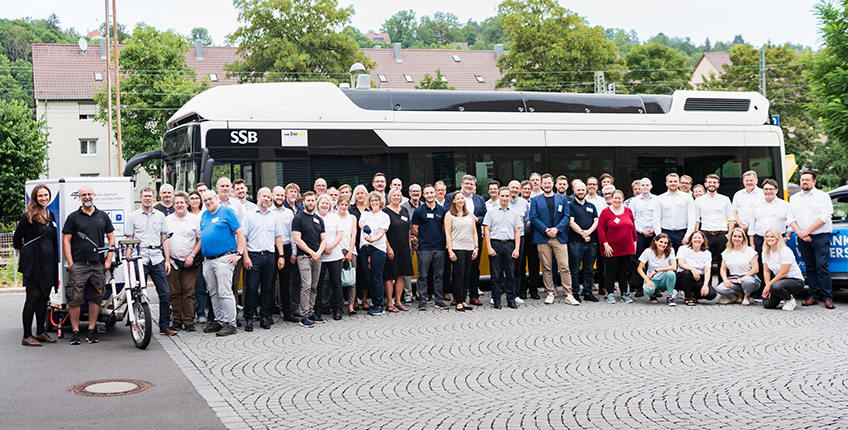For over a year, the districts of Tübingen and Reutlingen have been jointly driving forward the issue of green hydrogen in the Hy-NATuRe project (Hydrogen – Neckar-Alb-Reutlingen). On Thursday, 29 June 2023, the preliminary closing event of the project took place at Westspitze in Tübingen, with 60 regional players in attendance.
The jointly developed roadmap for a regional hydrogen economy was presented at the event. It was developed by selected hydrogen experts under the supervision of Ingenieurbüro für Wasserstofftechnologien EMCEL. It contains recommendations for action geared towards politics, administrative authorities and companies in the Neckar-Alb region. In order to establish a regional hydrogen economy, the existing hydrogen network is to be expanded and the information and public relations work is to be increased. The roadmap also recommends that learning workshops be established and approval processes be simplified, particularly for small hydrogen producers.
Around 60 actively participating stakeholders from various sectors, including hydrogen generation, distribution, hydrogen use and specialist expertise, came together for the final event to discuss the results of the project. In discussions with experts, participants were able to inform themselves and exchange information about funding opportunities, economic viability and business models as well as technological and market developments.
Reutlingen District Administrator Dr. Ulrich Fiedler was pleased about the broad participation in the project: “Our aim is to become one of the leading hydrogen regions. Because we are convinced that hydrogen technology will make a decisive contribution to the economic and societal transformation of our region into a climate-neutral future.”
Hydrogen production and demand potentials
The roadmap is based on calculations about how much hydrogen might potentially be needed in the region and how much could be produced. Forecasts indicate that hydrogen demand in the Reutlingen and Tübingen districts will be around 1,500 tonnes or 50 gigawatt hours by 2030, and around 13,500 tonnes or 450 gigawatt hours by 2045, especially in the transport sector. The generation and demand potentials are compared in a modelling exercise. The results show that by approximately 2035, the majority of the hydrogen required can be regionally produced.
Numerous projects for the generation of green hydrogen from renewable electricity by means of electrolysis as well as biogas are already underway in the region. One of the future uses of the hydrogen that is generated will be for powering hydrogen buses in local public transport, hydrogen trucks in logistics and hydrogen commercial vehicles, e.g. waste collection vehicles. The use of hydrogen-powered trains is also conceivable. In the medium term, the use of regional, green hydrogen in building technology and the conversion of industrial processes should help to reduce the emission of climate-damaging greenhouse gases in the districts.
The final event participants were able to get directly acquainted with how practical the various hydrogen vehicles are on the grounds of the Westspitze. The new fuel cell bus from SSB, a Toyota Mirai and a hydrogen-powered cargo bike were on display.
The future of Hy-NATuRe
The Hy-NATuRe project has demonstrated that a regional hydrogen economy in the Neckar-Alb region is possible and that there are many stakeholders already working on its implementation. The cooperation and networking of the actors will also be important in the future in order to raise the potential of hydrogen in the region.
A survey carried out for the project reinforces that the participating stakeholders are still both interested in and need a continuation of the activities of Hy-NATuRe. These include network meetings, workshops and information events to further advance the hydrogen economy in the region. Both districts will continue the network and look forward to having the chance to contribute to the energy transition in the region. The Head of Department for Economic Development in the district of Tübingen, Anke Armbrust-Hikel underlined: “The district of Tübingen, as a location for innovation, supports green hydrogen as an energy carrier and important technological developments, the production and use of which represent a significant building block for a sustainable future of our regional economy and a local contribution for the implementation of European climate goals.”
HyLand hydrogen regions
“HyLand – hydrogen regions in Germany“ is a competition launched in 2019 by the Federal Ministry for Digital and Transport (BMDV) that is already in its second round. The district of Reutlingen was already successful in the first round in 2020/21 as a HyStarter region.
In the second competition stage, HyExperts , the districts of Reutlingen and Tübingen successfully jointly applied. The development of the ‘Hy-NATuRe’ region as a hydrogen region was funded in the amount of 400,000 euros by the Federal Ministry for Digital and Transport. The funding guideline is coordinated by NOW GmbH and implemented by Project Management Jülich (PtJ). Further information can be found at www.hy.land.
Source of original release: Tübingen district
Image source: Die Kavallerie


